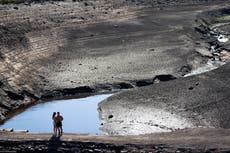Farm pesticides and medicines are ‘silent killer’ wiping out life in rivers, study says
Contamination by chemicals has more than doubled, researchers find

Agricultural pesticides and pharmaceutical chemicals are increasingly polluting England’s rivers, wiping out wildlife, an expert report reveals.
Conservationists say rivers are showing greater signs than ever of “chemical stress” and, as a result, are home to fewer riverfly species that are a key sign of healthy ecosystems.
They believe this summer’s drought, which brought low water levels, will have made chemicals more concentrated and exacerbated the damage they cause.
The report, Chemical Pollution: The Silent Killer of UK Rivers, based on a survey of 12 English rivers, reveals a drop in the diversity of riverfly species – mayflies, stoneflies and caddisflies – that indicate the state of waterways.
The tally of sites rated “poor” or “bad” was more than doubled that of previous years and was “considerably” higher than in 2015, 2016 and 2017, the study found.
The report said halting pollution at the source was vital, and the government’s forthcoming chemicals strategy is an opportunity to cut reliance on chemicals and ensure regulations are enforced.
That strategy, first promised in the 25-year environment plan in 2018, has since been repeatedly delayed.
The organisations behind the new research, WildFish, RSPB, Buglife and the Pesticide Collaboration, are calling for the government, among other things, to:
- Ensure farmers are given incentives to cut pesticides and artificial fertilisers
- Invest in non-chemical alternatives
- Ensure the “polluter pays” principle is upheld
- Maintain a “precautionary approach” to chemical approvals post-Brexit
- Fund a comprehensive river-monitoring network and enforcement of existing regulations.
Sarah Haynes, of the Pesticide Collaboration, said: “It often takes decades to realise the true harm of pesticides and other chemicals on our environment.
“Once the damage is done and a pesticide gets banned, a new chemical will enter the market… and so it goes on. Enough is enough.
“As the movement for nature-friendly farming swells, the government needs a proper plan to reduce pesticide use and help revive our rivers.”
Janina Gray, deputy chief executive at charity WildFish, said: “The results of the chemical report show that invertebrate communities are more stressed now than they were in our previous study, indicating the problem is getting worse.
“The chemical strategy is an opportunity to reverse the trend, but only if government steps up to the mark and acts now.”
The Independent has asked the Department for Environment, Food and Rural Affairs to comment.
Join our commenting forum
Join thought-provoking conversations, follow other Independent readers and see their replies
Comments




Bookmark popover
Removed from bookmarks